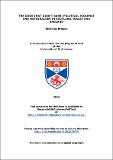Files in this item
The dogs that didn't bark : political violence and nationalism in Scotland, Wales and England
Item metadata
| dc.contributor.advisor | English, Richard | |
| dc.contributor.advisor | Wilson, Tim | |
| dc.contributor.author | Brooke, Nicholas | |
| dc.coverage.spatial | 246 p. | en_US |
| dc.date.accessioned | 2016-01-25T16:37:16Z | |
| dc.date.available | 2016-01-25T16:37:16Z | |
| dc.date.issued | 2016-06 | |
| dc.identifier | uk.bl.ethos.678186 | |
| dc.identifier.uri | https://hdl.handle.net/10023/8079 | |
| dc.description.abstract | The literature on terrorism and political violence covers in depth the reasons why some national minorities, such as the Irish, Basques and Tamils, have adopted violent methods as a means of achieving their political goals, but the study of why similar groups (such as the Scots and Welsh) remained non-violent, has been largely neglected. In isolation it is difficult to adequately assess the key variables behind why something did not happen, but when compared to a similar violent case, this form of academic exercise can be greatly beneficial. This thesis demonstrates what we can learn from studying ‘negative cases’ - nationalist movements that abstain from political violence - particularly with regards to how the state should respond to minimise the likelihood of violent activity, as well as the interplay of societal factors in the initiation of violent revolt. This is achieved by considering the cases of Wales, England and Scotland, the latter of which recently underwent a referendum on independence from the United Kingdom (accomplished without the use of political violence) and comparing them with the national movement in Ireland, looking at both violent and non-violent manifestations of nationalism in both territories. I argue no single factor can determine whether or not a national movement will adopt violent methods, but that key to this outcome is the way in which national identity is constructed. Additionally, I suggest that states can decrease the likelihood that nationalist movements will turn to violence by ensuring non-violent means of political mobilisation are perceived as legitimate and viable alternatives, and that the absence of precipitating factors (such as an overly aggressive state response or an existing precedent for violent revolt) will further reduce the risk. | en_US |
| dc.language.iso | en | en_US |
| dc.publisher | University of St Andrews | |
| dc.subject | Terrorism | en_US |
| dc.subject | Nationalism | en_US |
| dc.subject | Politics | en_US |
| dc.subject | British | en_US |
| dc.subject | Scotland | en_US |
| dc.subject | Wales | en_US |
| dc.subject | Identity | en_US |
| dc.subject | English | en_US |
| dc.subject.lcc | HN400.V5B8 | |
| dc.title | The dogs that didn't bark : political violence and nationalism in Scotland, Wales and England | en_US |
| dc.type | Thesis | en_US |
| dc.type.qualificationlevel | Doctoral | en_US |
| dc.type.qualificationname | PhD Doctor of Philosophy | en_US |
| dc.publisher.institution | The University of St Andrews | en_US |
This item appears in the following Collection(s)
Items in the St Andrews Research Repository are protected by copyright, with all rights reserved, unless otherwise indicated.

